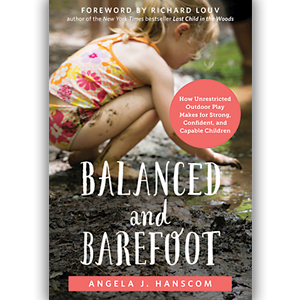The Benefits of Outdoor Play: A Review of Balanced and Barefoot
 It’s no surprise that children are spending more time than ever in front of screens. Why does it matter? According to pediatric occupational therapist Angela J. Hanscom, this trend means “more and more children are having difficulty with poor attention skills controlling emotions, balance, decreased strength and endurance, increased aggression, and weakened immune systems.” While Hanscom recognizes nutrition and exercise are two factors, in Balanced and Barefoot, she argues limited time independently playing outdoors is negatively impacting children’s development.
It’s no surprise that children are spending more time than ever in front of screens. Why does it matter? According to pediatric occupational therapist Angela J. Hanscom, this trend means “more and more children are having difficulty with poor attention skills controlling emotions, balance, decreased strength and endurance, increased aggression, and weakened immune systems.” While Hanscom recognizes nutrition and exercise are two factors, in Balanced and Barefoot, she argues limited time independently playing outdoors is negatively impacting children’s development.
Hanscom begins her book with questions I regularly hear parents asking: Why can’t my child sit still? Why does my child have an endless cold? Why doesn’t my child like to play? Then, Hanscom methodically addresses parents’ concerns to prove unrestricted outdoor play makes for strong, confident, and capable children. Her argument is so persuasive I started recommending this book to friends before I even finished reading it.
According to Hanscom, research indicates the “amount of time children spend in unstructured play has decreased by 50 percent.” As a result, many children don’t meet Hanscom’s movement recommendations. She maintains children under two years of age should move for four hours daily while older children should participate in three hours of rigorous physical activities. This will not only “keep gross motor skills in optimal condition” but will positively impact your child in a variety of ways.
I have reviewed 74 titles since Parenting by the Book began and this is the first one to explain the importance of the development of the vestibular sense, also known as our balance sense. Hanscom believes it is the most powerful one because it ensures “attention, balance, eye control, postural strength and more.” It’s best activated by spinning, which is why the extinction of merry-go-rounds is particularly meaningful.
Contrary to today’s “sit still” approach to education, children learn best when movement is a consistent part of their day. Hanscom explains one of the reasons why children fidget in class is because moving back and forth in their chairs enables them to activate their vestibular sense. According to Hanscom, they are “straining all of their resources in order to listen and learn.” The solution? Regular, active free play outdoors.
Hanscom does a great job of explaining why organized sports and adult-structured activities aren’t sufficient. Essentially, they don’t ignite the imagination. She explains true free play must be “motivated by means more than ends.” This is why, Hanscom explains, when children are having fun playing they don’t want it to end. “Play allows children opportunities to get creative, to practice regulating emotions, to enhance social development, and even to learn about themselves in the process,” Hanscom maintains.
Why outdoors? According to Hanscom, man-made environments, like movie theaters and colorful indoor play spaces, overpower children’s senses. Stimuli in nature tend to be more gentle, she explains. In addition to nature being a calming force, Hanscom also believes it promotes positive sensory integration, which leads to optimal brain and body performance. And outdoor play, particularly, improves eye function. This is something Hanscom thinks more and more parents should be concerned about since excessive screen time often leads to vision problems.
Like many parents, I’m worried about my kids spending too much time indoors. I read about Balanced and Barefoot while doing research on the importance of “Rescuing Recess” for this month’s issue of Richmond Family Magazine. Hanscom, the founder of TimberNook, which is an award-winning developmental and nature based program, writes convincingly on this issue as well. It has been my experience with parenting titles that they either present exhaustive research without practical suggestions or they recommend strategies without significant credible proof. Hanscom offers readers the perfect blend of both, which is why I will be suggesting Balanced and Barefoot every chance I get.
Follow @ParentbytheBook on Twitter for updates on blog posts or like Parenting by the Book on Facebook.






